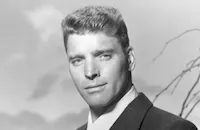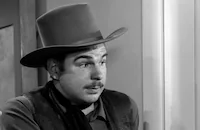In an era when Hollywood saw fit to cast Sal Mineo and Jeff Chandler as Native Americans, the ethnicity gap
widened by the casting of Burt Lancaster wasn't what turned
Jim Thorpe All American (1951) into
an underdog proposition. It was the film's struggle to put upbeat spin on a fundamentally downbeat story in a
period not noted for hard-hitting exposes of the system. Thorpe helped reinvent football with his on-field
prowess at the Carlisle Indian Industrial School. He was named All-American in 1911 and 1912 after scoring
every point in an upset victory over Harvard and, to beat Army, returning a kickoff 97 yards for a touchdown
immediately after having a 92-yard touchdown return nullified by a penalty. But he couldn't defeat the off-field
forces arrayed against him.
Foremost among them was racism. In an ironic forerunner to Jesse Owens' smashing of Hitler's Master Race
stereotypes in 1936, Thorpe, of Oklahoma's Sac Fox tribe, demolished the competition at the 1912 Olympics
in Stockholm. But after making history by winning the pentathlon and decathlon, his medals were stripped
from him with stern zeal in 1913 when it was learned that he played baseball for two summers in the East
Carolina League, which disqualified him as an amateur. The straightforward Thorpe had played under his own
name, unlike most moonlighting college athletes, who used aliases.
Thus declared a pro, Thorpe signed to play baseball with the New York Giants and as well played football
with the Canton Bulldogs in a run-up to the National Football League. He played nine years in the majors
(1913-1922), and retired from pro football in 1928, aged 41. He was to be belatedly acclaimed as America's
greatest and most versatile athlete, but not nearly in time to head off the slow downhill slide of his life,
exacerbated by bitterness and alcoholism. Off the field, he drifted through various jobs, including, on many
occasions, movie jobs, often as extras, usually as Indians. Seen briefly in a non-speaking role in Jim Thorpe
All American, he's also listed as a consultant on the film. Not two years after it was released, Thorpe died
broke in his trailer in Lomita, California.
Which is not to say that Lancaster didn't approach the project with all the good will one could hope for, in
addition to his superb physicality. Outspoken liberal activist Lancaster can be assumed to have been
motivated by a wish to right injustices suffered by Thorpe. Lancaster still hadn't made the move from what he
later was to dismissively term his teeth and muscles period into the more complex characters he fashioned in
Come Back, Little Sheba (1952),
From Here to Eternity (1953),
Sweet Smell of
Success (1957),
Elmer Gantry (1960),
Birdman of Alcatraz (1962) and
The Leopard
(1963) -- all the way to the autumnal Atlantic City (1980). No small part of the positives wrung from Thorpe's
sad saga stems from Lancaster's ability to convince us of Thorpe's sense of relief when immersed in the
purely physical running, dodging tacklers on a football field, using his sureness, confidence and quickness
to spot sudden openings and dart through them.
In contrast, he communicates what might be called the unbearable heaviness of being, simply by stopping
and letting us register his quiet cessation of motion and its replacement by inertia as his natural zest drains
away when life throws Thorpe for loss after loss off the field. Despite the skeletal simplism of many of his
scenes, Lancaster's is a subtler performance than it appears. His lapses into the bottle here portend the
tension in his scenes as a man battling alcoholism in
Come Back, Little Sheba. To watch his
shoulders slump in defeat when he receives a telegram that his young son has died, and his stricken guilt
turns into an outburst against his coach, is to watch an actor plumbing himself to expand his expressive
range, graceful even in dejection. Yet even here, to one even slightly familiar with Thorpe's story, Hollywood's
compromises diminish it.
Charles Bickford is steadily ingratiating, supplying unswerving supportiveness as Thorpe's mentor and father
figure, the equally legendary coach Pop Warner, encouraging Thorpe at first, then shining like a beacon
through the wreckage of Thorpe's later life. We see him jump-start Thorpe's rehabilitation by persuading him
to attend the 1932 Los Angeles Olympics, after which Thorpe finds himself, we are asked to believe, by
encountering a team of boys playing football on a lot near the railroad tracks where Thorpe is driving his truck.
After running over their ball, he becomes their mentor, catalyzing an upbeat cycle that concludes when
Warner ushers Thorpe into the Oklahoma State Hall of Fame at a dinner that serves as the story's framing
device.
Thorpe had eight children by three wives. We see only his first son, who died young, and his first wife, played
by Phyllis Thaxter as a loyal, loving woman until her reserves of both run out. The film has been stitched
together by a skilled director, Michael Curtiz, of
Casablanca (1941) fame, who knew from biopics,
having helmed
Yankee Doodle Dandy (1942) and
Night and Day (1946) -- with
The Will
Rogers Story (1953)
The Jazz Singer (1953) and
The Helen Morgan Story (1960) to come.
Jim Thorpe All American makes clear his ability to efficiently accordion a lot of biographical detail
into a series of snappy montages in a film that runs 107 minutes. But there's more than just condensation
here. You're painfully aware that there's a lot of glossing over. A nostalgic glow hovers over Carlisle. In fact, it
was a harsh place, founded in 1879 by an Army general, Richard Pratt, in order to squeeze the cultural
identity out of Native Americans. "Kill the Indian to save the man" was his motto. He was forced out in 1904.
Carlisle closed in 1918, a failure with a graduation rate of only 8%, never duplicating its gridiron glory in the
classroom.
One would also like to assume that the film's choice of incidental music was ironic, especially Thorpe's Wall
Street ticker tape parade to the strains of Yankee Doodle Dandy and the Carlisle song being sung to the
melody of "O Tannenbaum." The Carlisle Institute was no Christmas present to Native Americans. It would be
unfair to think of
Jim Thorpe All American as a lump of coal in our collective Christmas stocking. It
may not go all the way with the facts. But neither does it traffic in outright lies, for all its softening, consoling
gestures to the American mainstream.
For more information about
Jim Thorpe-All-American, visit
Warner Video. To order
Jim Thorpe-All-American, go to
TCM Shopping.
by Jay Carr

































